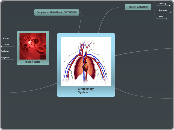
Circulartory System
Types of Circulation
Pulmonary
lungs
heart
Coronary
heart tissue
Sysetemic
heart
body
Blood
Red Blood Cells
contain Hemoglobin
Erthrocytes
White Blood Cells
figh infection
luekocytes
Platelets
Help form blood clots
thrombocytes
Carries O2 and nuytrients to cell
Controls body temp.
Carries CO2 and waste away from cell
Plasma
Liquid part of blood
Mostly water mixed with some nutrients
Blood Types
Type B
Can recieve B and O
Can donate to B and AB
Type AB
Can recieve all
Can donate to AB
Universal Donor
Type O
Universal Recipient
Type AB
Type O
Can recieve O
Can donate to all
Type A
Can donate A and AB
Can recieve Type A and O

Heart
organ made from cardiac muscels
pumps blood
Hollow and Muscular
Septum
Seperates oxygenated blood from deoxygenated blood
Designed to ABSORB and DISTRIBUTE

Blood Vessles
Arteries
carries O2 blood away from heart
Thick and Muscular
Pulse in sync with heart
Branches of into smaller arterioles
Arota
largest artery in the body
takes blood from heart to all parts of body
Pulmonary Arteries
Blood goes from heart to lungs
Breaks into smaller arterioles
Veins
carry deoxinated blood to heart
Pulmonary vein
Thin not very muscular
Break into smaller venules
Blood pushed back to heart
Vena Cava
largest vein
oxygen poor blood enters heart from body
Branches into smaller venules
Capilaries
1 cell thick THIN!!!
excahnge of gases with body tissues
Connect arterioles to venules
Lymphatic System
Lymph
consists of water and disolved minerals such as glucose
Network of vein like vessels that return fluid to blood stream
Types of Cardiovascular Diseases
Atherosclerosis
Artery thickness result of fatty buildups
Hypertention
when someones blood normally higher than normal
Heart Attack
Flow of blood blocked
